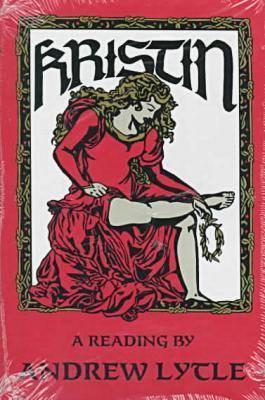This beautiful little book—one that does much credit to its publisher— appears as a blessing amid the clutter and noise and ugliness that characterize the publishing industry as well as literary discourse today. A pleasure to hold and to behold, this volume is also the vehicle for rendering words, thoughts, and values that seem new because they are traditional, and indeed are new because of the controlled brilliance of their exposition. This essay or monograph, in other words, is to be prized not only for what it says but for what it does not say.
Kristin must be approached through its layers of context. First, it is a reading of the trilogy known collectively as Kristin Lavransdatter (1920-22), the most famous work of Sigrid Undset (1882-1949), the Danish-born Norwegian who won the Nobel Prize for Literature in 1928. Kristin Lavransdatter is not a book one hears much about today, but it ought to be. It has sometimes been called the greatest of historical novels, and its author the greatest writer of her sex. Epic in scope, realistic in detail, and spiritual in focus, Undset’s vision of medieval Norway is brooding, comprehensive, and unsentimental. Undset’s spiritually attuned sensibility led her to a conversion to Roman Catholicism in 1924 (a commitment clearly anticipated in her great novel). As a logical consequence of her Christian principles, the Nazis burned her books. Sigrid Undset, in her essays, rejected humanism, liberalism, materialism, science, and psychology—and I mention these aspects of her life not only because Mr. Lytle does not address them directly, but because such ideas suggest a connection with the prophetic power of Flannery O’Connor, who studied the writing of fiction with Andrew Lytle. Kristin is a reading of Undset’s novel, and the values that are inferred are the medieval and Christian ones we would expect from the period, from Undset—and from Lytle. It is also the expression of a particular personality, one sympathetic to Undset’s vision and technique, as well as the product of a great American man of letters—perhaps our greatest living author—in his 90th year.
In his incisive and illuminating foreword to Kristin, Professor Thomas Carlson of the University of the South recounts how Andrew Lytle, an inspiring teacher of history, reading, and writing, used Kristin Lavransdatter in the late 1970’s to replace War and Peace in his classes at Sewanee, and how he read from this essay in Savannah in June 1991 as commissioned by St. John’s Church there as part of its sesquicentennial celebration. Kristin embodies some of the ideas and insights that Lytle uniquely imparted to his students and later shared with other audiences and friends. The work of a brilliant reader of fiction—certainly one of the most penetrating and refreshing critics of great fiction that America has produced— Kristin belongs with Lytle’s The Hero With the Private Parts (1966) and the expanded Southerners and Europeans (1988), both mandatory gatherings of compelling literary interpretations.
But if Kristin expresses the teacher and the critic, it shows the artist as well, for it emerges from the imagination that formed The Long Night (1936), At the Moon’s Inn (1941), and The Velvet Horn (1957), powerful novels of historical vision and Christian sensibility that have a certain affinity with the finest works of Sigrid Undset. As Professor Carlson points out, Andrew Lytle’s essay on Emma Bovary, “In Defense of a Passionate and Incorruptible Heart,” prompted Allen Tate to observe that Lytle wrote “about Madame Bovary as if he had written Flaubert’s masterpiece.” The title of that essay was already taken when he later addressed the “inordinate passion” of Kristin Lavransdatter, but the sympathy, the understanding, and the heightened imaginative response were in no way forestalled. Andrew Lytle writes about Kristin Lavransdatter as though he had written Undset’s masterpiece.
Fusing historical knowledge, theological perception, artistic insight, moral awareness, and sheer readerly intuition, he gets under the book’s skin and wears it as his own. The intensity of apprehension sometimes transcends the distinction between Undset’s fictional discourse and Lytle’s own voice, bridging a logical gap by way of a thoroughgoing identification with, and even a unifying love of, a text whose author is nowhere mentioned in this reading. Complete identification can go no further, so that Undset’s novel has already become “Kristin’s saga” in Lytle’s first two words. This reading is of an overwhelming reality, not of what someone or other merely inscribed or typed.
Such an approach can only be judged by its results, one of which paradoxically is to emphasize the stature of Undset’s achievement by pointing to its universal import; for if Lytle reads as if he had written Undset’s magnum opus, Undset wrote as if she had comprehended Norway, the Middle Ages, and human destiny. Andrew Lytle’s “reading” not only clarifies for us the meaning of realistic images and what they symbolize (as we might expect a critic to do), but instructs us in interpreting the meaning of human actions and failures and their relation to “the enveloping action,” the larger motion that is so often scanted by contemporary interpreters who have not the insight and the world view of Andrew Lytic. His comprehensive understanding of Undset’s vision, of the balance of medieval culture, includes the obligations of mother and father, wife and husband, daughter and son, vassal and lord, parishioners and priest, the private and the public, the spiritual and the carnal, and life and death. At the end, to see “the divine connection between the renewing snow and the plague’s holocaust,” and to see a mother’s death as an instruction in the mystery of creation, is to stare deep not only into Kristin Lavransdatter but into something that surpasses literary criticism as well as mundane understanding.
[Kristin: A Reading, by Andrew Lytle (Columbia: University of Missouri Press) 112 pp., $17.95]

Leave a Reply